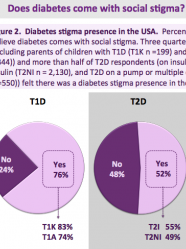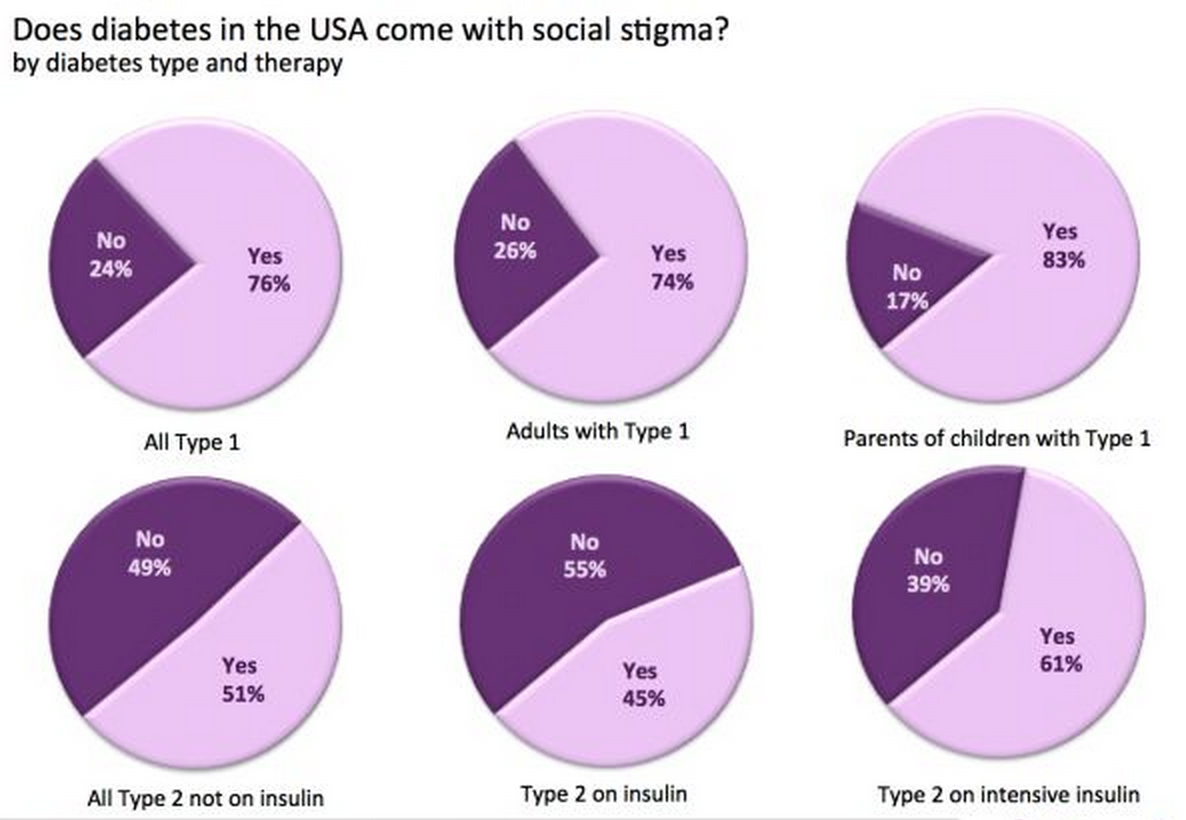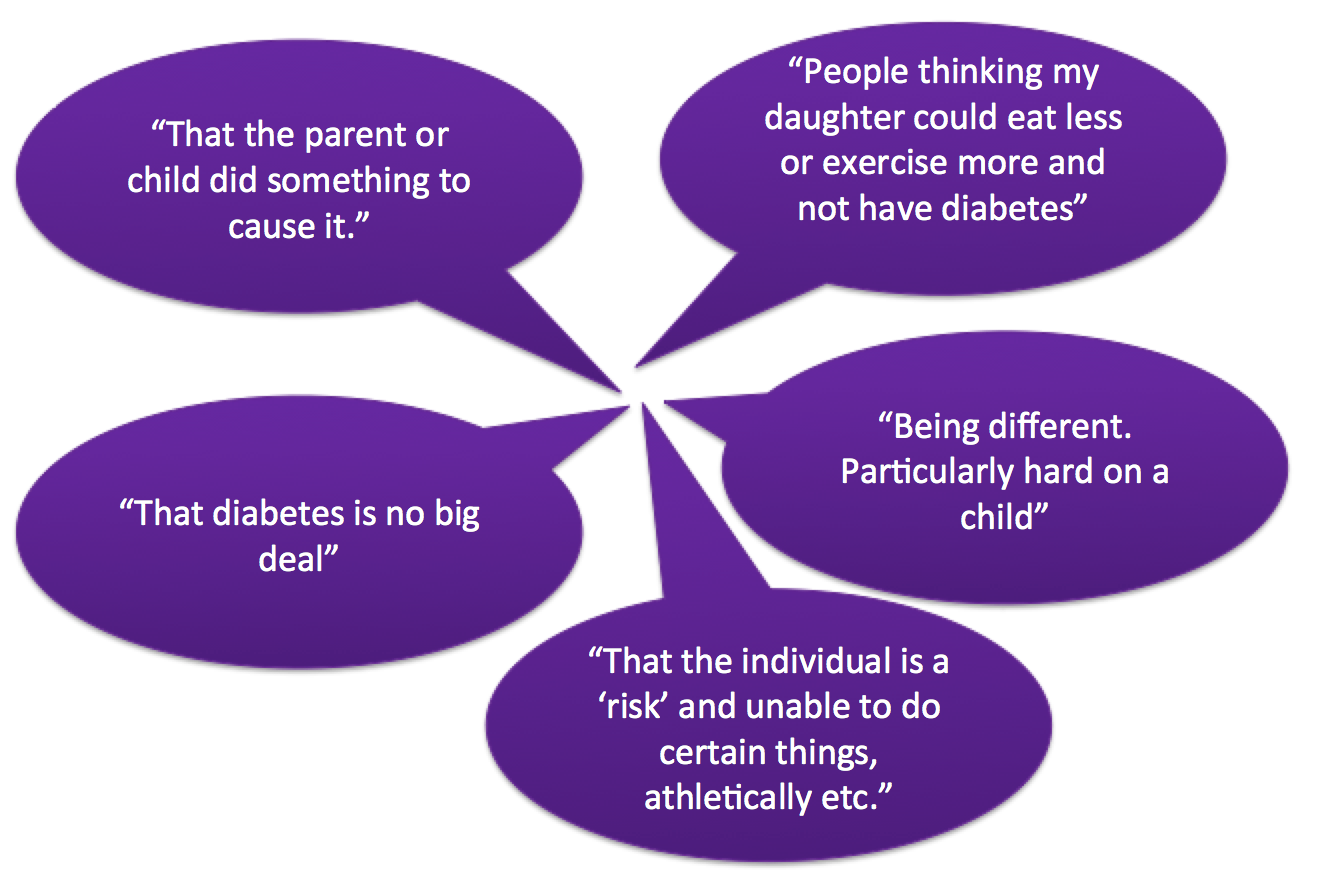The Numbers of Shame and Blame: How Stigma Affects Patients and Diabetes Management

By Alexander Wolf and Nancy Liu
Twitter summary: What’s the impact of #dstigma on people w/ #diabetes? A survey of 5,000 patients finds stigma is real 4 majority+impacts management
Short summary: In a survey of over 5,000 people with type 1 and type 2 diabetes, the market research company dQ&A found that stigma affects a majority of patients. Find out which groups of people feel the most stigmatized, the feelings and experiences of stigma, and how it can affect the ability of people to manage their care.
Does diabetes come with a social stigma? For many type 1 or type 2 patients, the unfortunate answer is “yes.” Arguably, only a few diseases carry the same feelings of shame and blame as diabetes, and these negative emotions can affect the way people view their disease and approach their management. And yet, for such an important topic, there has been little research done to understand the matter. Recently, the market research company dQ&A (“Diabetes Questions and Answers”) asked patients how stigma affects their diabetes management. The results were presented at ADA and at this year’s Friends for Life conference. dQ&A surveyed 5,410 people with diabetes (~30% with type 1 and ~70% with type 2) – many of them readers of diaTribe – and the study results were eye opening.
 Does diabetes come with social stigma? Social stigma is described as a set of negative beliefs or a mark of disapproval that society has for a certain group or disease. The study affirmed what many people touched by diabetes have said for years: Stigma is real, and it affects the majority of people living with diabetes.
Does diabetes come with social stigma? Social stigma is described as a set of negative beliefs or a mark of disapproval that society has for a certain group or disease. The study affirmed what many people touched by diabetes have said for years: Stigma is real, and it affects the majority of people living with diabetes.
Overall, type 1 patients reported experiencing more stigma than people with type 2. Parents of children with type 1 diabetes reported the most stigma of all, and stigma tended to increase with more intense or visible management.
-
76% of people with type 1 said they felt stigmatized, compared to 52% of people with type 2.
-
83% of parents of children with type 1 reported feeling stigmatized, much higher than the 74% for type 1 adults. This may seem surprising, as many parents reported feeling blamed for “causing” their child’s diabetes – a major example of public misperceptions about diabetes.
-
61% of people with type 2 diabetes on intensive insulin therapies (i.e., using multiple daily injections or an insulin pump) reported feeling stigmatized, compared to just 51% of people taking pills only. The finding that stigma increased with more intensive therapy may be due in part to the therapy’s more visible nature: fingersticks, shots, CGMs, and pumps are all part of the mix, though the public may not fully understand they are important for proper care.
What forms of stigma do people with diabetes face, and what feelings have they .png) experienced? Of those who responded that diabetes does come with a stigma, most perceived a sense of failure of personal responsibility. Many respondents also felt that diabetes was perceived as a burden on the healthcare system or diabetes was seen as a character flaw. These perceptions can in turn lead people to feel “guilt, shame, embarrassment, isolation or blame.”
experienced? Of those who responded that diabetes does come with a stigma, most perceived a sense of failure of personal responsibility. Many respondents also felt that diabetes was perceived as a burden on the healthcare system or diabetes was seen as a character flaw. These perceptions can in turn lead people to feel “guilt, shame, embarrassment, isolation or blame.”
The media certainly play a role in these perceptions: For example, a recent New York Times article blamed rising healthcare costs in part on the price of diabetes innovation, with a particular focus on patients who buy unnecessary features for their devices (read our response to the article here).
Many people also expressed frustration that society perceived diabetes as not a big deal, that it’s something that can be completely managed by lifestyle choices, or that individuals were at blame for causing their disease. This stigma applied to both type 1 and type 2 patients. Type 1, of course, has no relationship to lifestyle choices, and type 2 is heavily influenced by genetics, societal risk factors, and aging as well as lifestyle factors.
How are the lives of people with diabetes affected by other people’s perceptions? An important takeaway from this study was not only that people with diabetes feel stigmatized, but also that this stigma affects their personal relationships and disease management. 
What does this all mean? The survey results indicate the need for more education and awareness in the public about diabetes and the challenges of disease management. Many testimonials from patients demonstrated the frustrations of dealing with the many misconceptions the public has about diabetes, from not understanding the differences between type 1 and type 2, thinking management should be easy, or that individuals should be blamed for having the disease. However, there is reason to believe that these changes can happen. Diabetes stigma has diminished over time from the days where kids with type 1 diabetes couldn’t attend summer camps, go on field trips, or were denied certain foods, and adults feared losing their jobs and desperately tried to hide their condition. With these gains in mind, we can think of stigma as an evolving story – where one day it will no longer be yet another challenge to improving management and living a happier and healthier life.
For more information on diabetes stigma, please see the full stigma poster presented at ADA at diaTribe.org/stigmaposter and the #dstigma conversation on Twitter. And if you want to share your story with us about how stigma has impacted your life, please email us and let us know about your experiences.
[Editor's note: Disclosure: diaTribe is supported in part by donations from participants in dQ&A surveys.]
Never miss an update by signing up here to receive free updates on future diaTribe articles.







